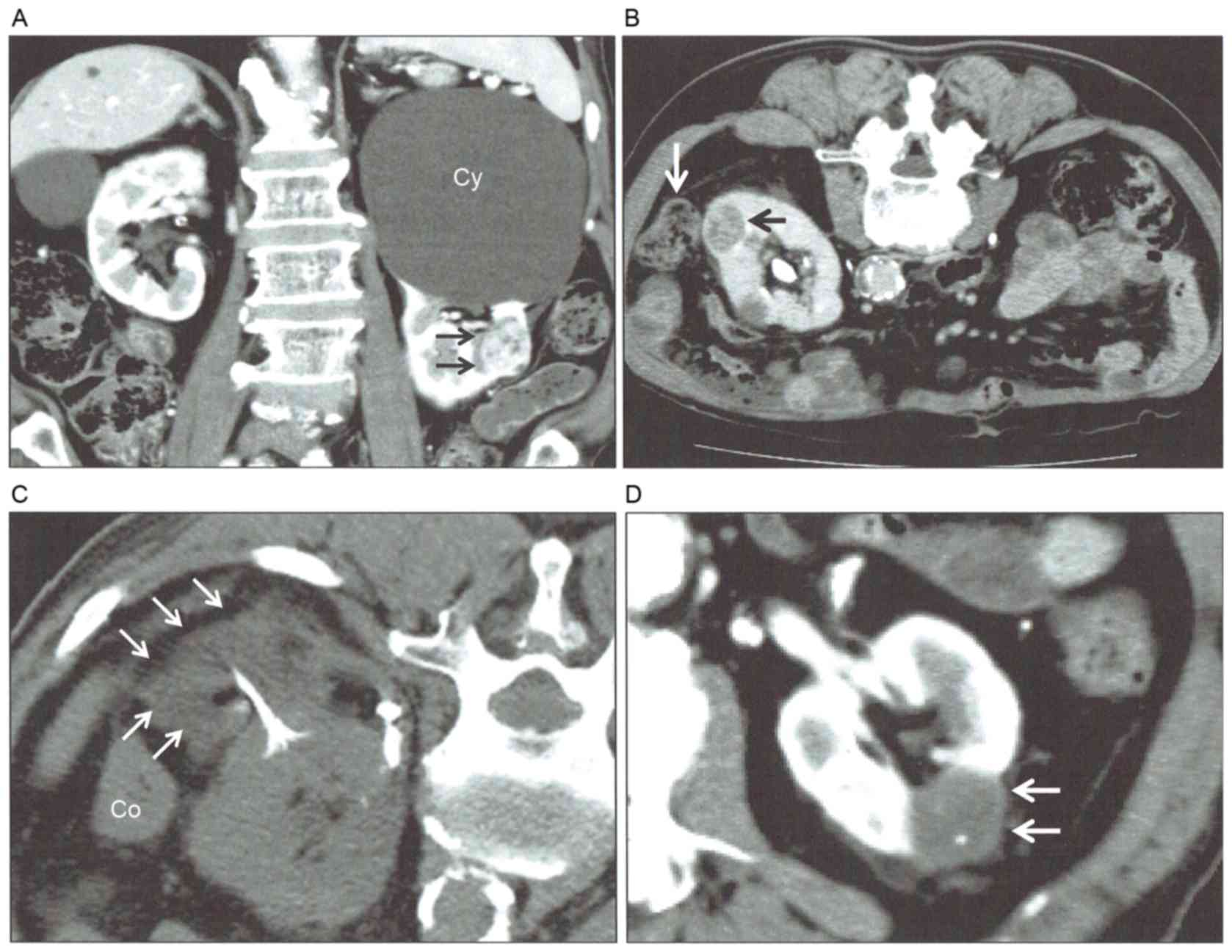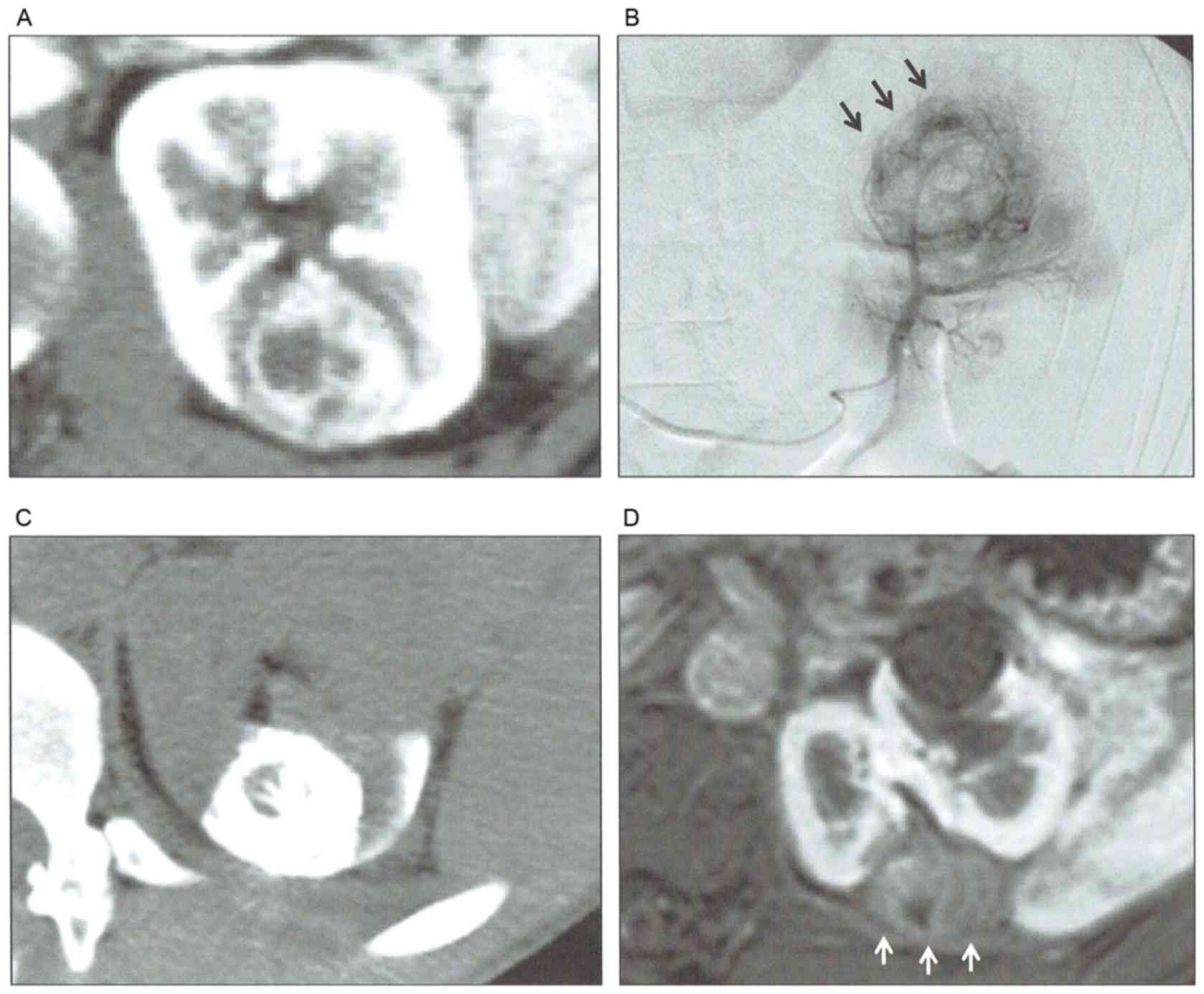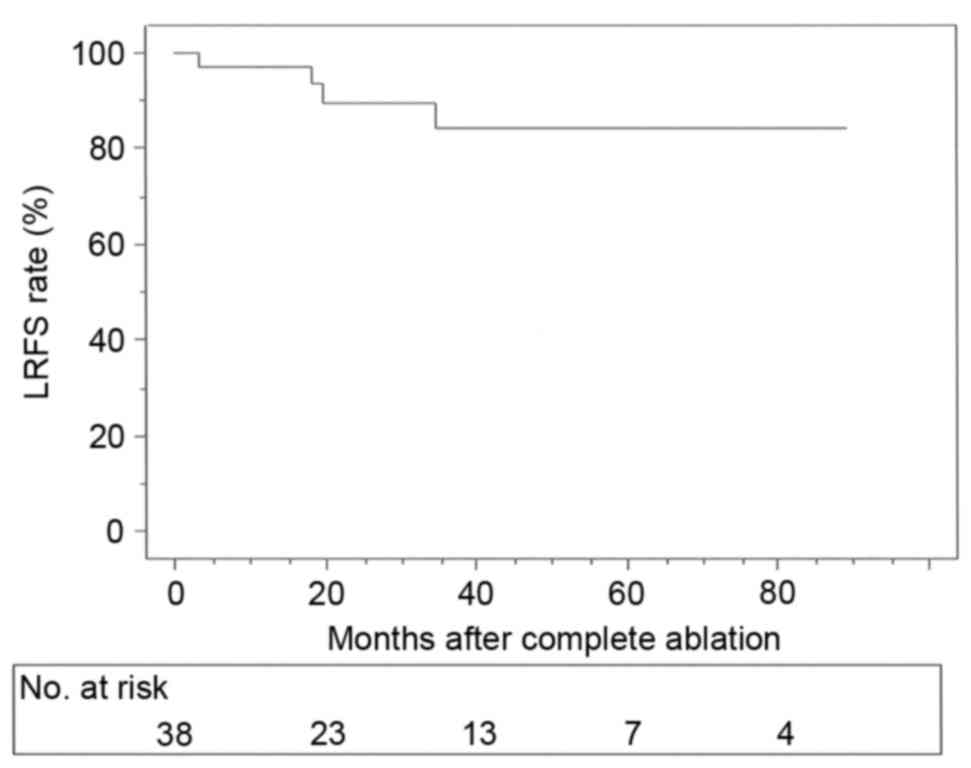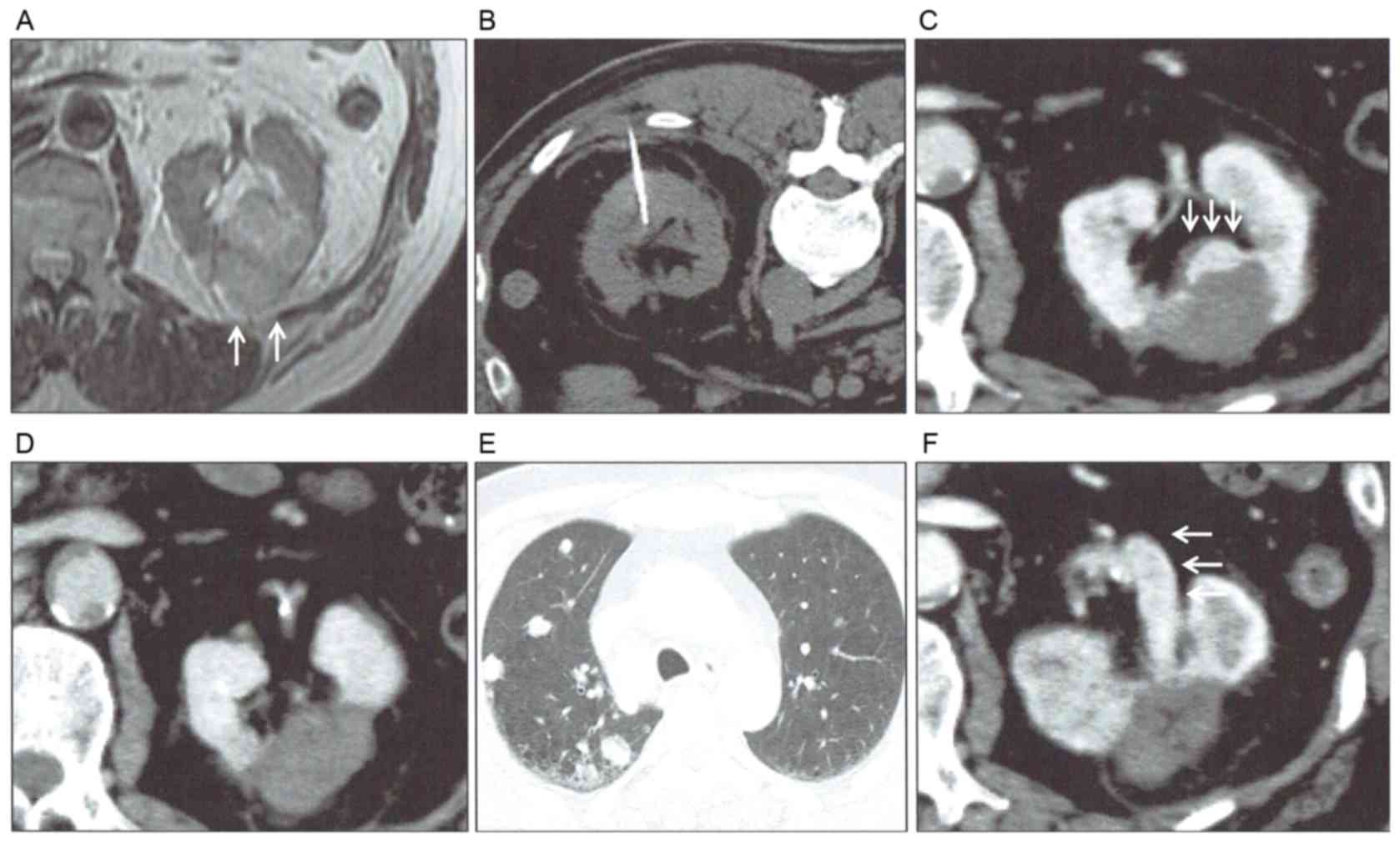|
1
|
Belldegrun A, Tsui KH, deKernion JB and
Smith RB: Efficacy of nephron-sparing surgery for renal cell
carcinoma: Analysis based on the new 1997 tumor-node-metastasis
staging system. J Clin Oncol. 17:2868–2875. 1999. View Article : Google Scholar : PubMed/NCBI
|
|
2
|
Lam JS, Shvarts O and Pantuck AJ: Changing
concepts in the surgical management of renal cell carcinoma. Eur
Urol. 45:692–705. 2004. View Article : Google Scholar : PubMed/NCBI
|
|
3
|
Patard JJ, Tazi H, Bensalah K, Rodriguez
A, Vincendeau S, Rioux-Leclercq N, Guillé F and Lobel B: The
changing evolution of renal tumours: A single center experience
over a two-decade period. Eur Urol. 45:490–494. 2004. View Article : Google Scholar : PubMed/NCBI
|
|
4
|
Pignot G, Bigot P, Bernhard JC, Bouliere
F, Bessede T, Bensalah K, Salomon L, Mottet N, Bellec L, Soulié M,
et al: Nephron-sparing surgery is superior to radical nephrectomy
in preserving renal function benefit even when expanding
indications beyond the traditional 4-cm cutoff. Urol Oncol.
32:1024–1030. 2014. View Article : Google Scholar : PubMed/NCBI
|
|
5
|
Ito K, Nakashima J, Hanawa Y, Oya M,
Ohigashi T, Marumo K and Murai M: The prediction of renal function
6 years after unilateral nephrectomy using preoperative risk
factors. J Urol. 171:120–125. 2004. View Article : Google Scholar : PubMed/NCBI
|
|
6
|
Süer E, Burgu B, Gökce Mİ, Türkölmez K,
Bedük Y and Baltaci S: Comparison of radical and partial
nephrectomy in terms of renal function: A retrospective cohort
study. Scand J Urol Nephrol. 45:24–29. 2011. View Article : Google Scholar : PubMed/NCBI
|
|
7
|
Huang WC, Levey AS, Serio AM, Snyder M,
Vickers AJ, Raj GV, Scardino PT and Russo P: Chronic kidney disease
after nephrectomy in patients with renal cortical tumours: A
retrospective cohort study. Lancet Oncol. 7:735–740. 2006.
View Article : Google Scholar : PubMed/NCBI
|
|
8
|
Zini L, Perrotte P, Capitanio U, Jeldres
C, Shariat SF, Antebi E, Saad F, Patard JJ, Montorsi F and
Karakiewicz PI: Radical versus partial nephrectomy: Effect on
overall and noncancer mortality. Cancer. 115:1465–1471. 2009.
View Article : Google Scholar : PubMed/NCBI
|
|
9
|
Zini L, Patard JJ, Capitanio U, Crepel M,
de La Taille A, Tostain J, Ficarra V, Bernhard JC, Ferrière JM,
Pfister C, et al: Cancer-specific and non-cancer-related mortality
rates in European patients with T1a and T1b renal cell carcinoma.
BJU Int. 103:894–898. 2009. View Article : Google Scholar : PubMed/NCBI
|
|
10
|
Lesage K, Joniau S, Fransis K and Poppel
HV: Comparison between open and radical nephrectomy for renal
tumors: Perioperative outcome and health-related quality of life.
Eur Urol. 51:614–620. 2007. View Article : Google Scholar : PubMed/NCBI
|
|
11
|
Berdjis N, Hakenberg OW, Novotny V,
Froehner M and Wirth MP: Treating renal cell cancer in the elderly.
BJU Int. 97:703–705. 2006. View Article : Google Scholar : PubMed/NCBI
|
|
12
|
Steinbach F, Novick AC, Zincke H, Miller
DP, Williams RD, Lund G, Skinner DG, Esrig D, Richie JP, deKernion
JB, et al: Treatment of renal cell carcinoma in von Hippel-Lindou
disease: A multicenter study. J Urol. 153:1812–1816. 1995.
View Article : Google Scholar : PubMed/NCBI
|
|
13
|
Metwalli AR and Linehan WM:
Nephron-sparing surgery for multifocal and hereditary renal tumors.
Curr Opin Urol. 24:466–473. 2014. View Article : Google Scholar : PubMed/NCBI
|
|
14
|
Ferakis N, Bouropoulos C, Granitsas T,
Mylona S and Poulias I: Long-term results after
computed-tomography-guided percutaneous radiofrequency ablation for
small renal tumors. J Endourol. 24:1909–1913. 2010. View Article : Google Scholar : PubMed/NCBI
|
|
15
|
Tracy CR, Raman JD, Donnally C, Trimmer CK
and Cadeddu JA: Durable oncologic outcomes after radiofrequency
ablation: Experience from treating 243 small renal masses over 7.5
years. Cancer. 116:3135–3142. 2010. View Article : Google Scholar : PubMed/NCBI
|
|
16
|
Olweny EO, Park SK, Tan YK, Best SL,
Trimmer C and Cadeddu JA: Radiofrequency ablation versus partial
nephrectomy in patients with solitary clinical T1a renal cell
carcinoma: Comparable oncologic outcomes at a minimum of 5 years of
follow-up. Eur Urol. 61:1156–1161. 2012. View Article : Google Scholar : PubMed/NCBI
|
|
17
|
Psutka SP, Feldman AS, McDougal WS,
McGovern FJ, Mueller P and Gervais DA: Long-term oncologic outcomes
after radiofrequency ablation for T1 renal cell carcinoma. Eur
Urol. 63:486–492. 2013. View Article : Google Scholar : PubMed/NCBI
|
|
18
|
Ma Y, Bedir S, Cadeddu JA and Gahan JC:
Long-term outcomes in healthy adults after radiofrequency ablation
of T1a renal tumours. BJU Int. 113:51–55. 2014. View Article : Google Scholar : PubMed/NCBI
|
|
19
|
Wah TM, Irving HC, Gregory W, Cartledge J,
Joyce AD and Selby PJ: Radiofrequency ablation (RFA) of renal cell
carcinoma (RCC): Experience in 200 tumours. BJU Int. 113:416–428.
2014. View Article : Google Scholar : PubMed/NCBI
|
|
20
|
Ramirez D, Ma YB, Bedir S, Antonelli JA,
Cadeddu JA and Gahan JC: Laparoscopic radiofrequency ablation of
small renal tumors: Long-term oncologic outcomes. J Endourol.
28:330–334. 2014. View Article : Google Scholar : PubMed/NCBI
|
|
21
|
Kutikov A and Uzzo RG: The R.E.N.A.L.
nephrometry score: A comprehensive standardized system for
quantitating renal tumor size, location and depth. J Urol.
182:844–853. 2009. View Article : Google Scholar : PubMed/NCBI
|
|
22
|
Koda M, Tokunaga S, Miyoshi K, Kishina M,
Fujise Y, Kato J, Matono T, Okamoto K, Murawaki Y and Kakite S:
Assessment of ablative margin by unenhanced magnetic resonance
imaging after radiofrequency ablation for hepatocellular carcinoma.
Eur J Radiol. 81:2730–2736. 2012. View Article : Google Scholar : PubMed/NCBI
|
|
23
|
Schmit GD, Thompson RH, Kurup AN, Weisbrod
AJ, Boorjian SA, Carter RE, Geske JR, Callstrom MR and Atwell TD:
Usefulness of R.E.N.A.L. nephrometry scoring system for predicting
outcomes and complications of percutaneous ablation of 751 renal
tumors. J Urol. 189:30–35. 2013. View Article : Google Scholar : PubMed/NCBI
|
|
24
|
Uribe PS, Costabile RA and Peterson AC:
Progression of renal tumors after laparoscopic radiofrequency
ablation. Urology. 68:968–971. 2006. View Article : Google Scholar : PubMed/NCBI
|
|
25
|
Seki T, Tamai T, Ikeda K, Imamura M,
Nishimura A, Yamashiki N, Nakagawa T and Inoue K: Rapid progression
of hepatocellular carcinoma after transcatheter arterial
chemoembolization and percutaneous radiofrequency ablation in the
primary tumour region. Eur J Gastroenterol Hepatol. 13:291–294.
2001. View Article : Google Scholar : PubMed/NCBI
|
|
26
|
Ruzzenente A, Manzoni GD, Molfetta M,
Pachera S, Genco B, Donataccio M and Guglielmi A: Rapid progression
of hepatocellular carcinoma after radiofrequency ablation. World J
Gastroenterol. 10:1137–1140. 2004.PubMed/NCBI
|
|
27
|
Obara K, Matsumoto N, Okamoto M, Kobayashi
M, Ikeda H, Takahashi H, Katakura Y, Matsunaga K, Ishii T, Okuse C,
et al: Insufficient radiofrequency ablation therapy may induce
further malignant transformation of hepatocellular carcinoma.
Hepatol Int. 2:116–123. 2008. View Article : Google Scholar : PubMed/NCBI
|
|
28
|
Dong S, Kong J, Kong F, Kong J, Gao J, Ke
S, Wang S, Ding X, Sun W and Zheng L: Insufficient radiofrequency
ablation promotes epithelial-mesenchymal transition of
hepatocellular carcinoma cells through Akt and ERK signaling
pathways. J Transl Med. 11:2732013. View Article : Google Scholar : PubMed/NCBI
|
|
29
|
Kroeze SG, van Melick HH, Nijkamp MW,
Kruse FK, Kruijssen LW, van Diest PJ, Bosch JL and Jans JJ:
Incomplete thermal ablation stimulates proliferation of residual
renal carcinoma cells in a translational murine model. BJU Int.
110:E281–E286. 2012. View Article : Google Scholar : PubMed/NCBI
|
|
30
|
Hines-Peralta A and Goldberg SN: Review of
radiofrequency ablation for renal cell carcinoma. Clin Cancer Res.
10:6328S–6334S. 2004. View Article : Google Scholar : PubMed/NCBI
|
|
31
|
Lian H, Guo H, Zhang G, Yang R, Gan W, Li
X, Ji C and Liu J: Single-center comparison of complications in
laparoscopic and percutaneous radiofrequency ablation with
ultrasound guidance for renal tumors. Urology. 80:119–124. 2012.
View Article : Google Scholar : PubMed/NCBI
|
|
32
|
Lucas SM, Stern JM, Adibi M, Zeltser IS,
Cadeddu JA and Raj GV: Renal function outcomes in patients treated
for renal masses smaller than 4 cm by ablative and extirpative
techniques. J Urol. 179:75–80. 2008. View Article : Google Scholar : PubMed/NCBI
|
|
33
|
Hoffmann RT, Jakobs TF, Kubisch CH, Trumm
C, Weber C, Siebels M, Helmberger TK and Reiser MF: Renal cell
carcinoma in patients with a solitary kidney after nephrectomy
treated with radiofrequency ablation: Mid term results. Eur J
Radiol. 73:652–656. 2010. View Article : Google Scholar : PubMed/NCBI
|
|
34
|
Raman JD, Raj GV, Lucas SM, Williams SK,
Lauer EM, Ahrar K, Matin SF, Leveillee RJ and Cadeddu JA: Renal
functional outcomes for tumours in a solitary kidney managed by
ablative or extirpative techniques. BJU Int. 105:496–500. 2010.
View Article : Google Scholar : PubMed/NCBI
|


















